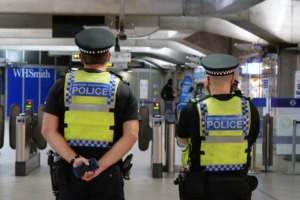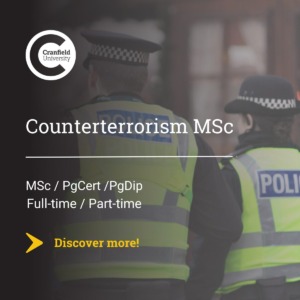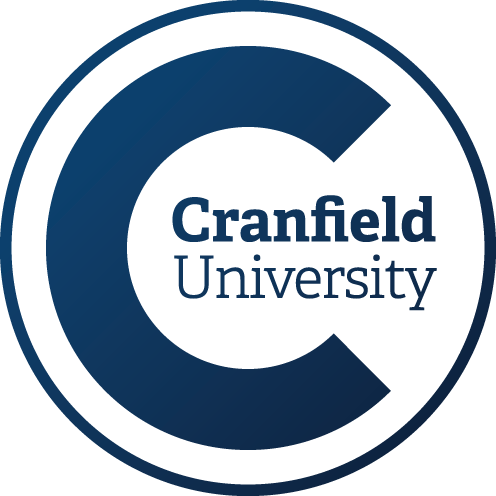How does Cranfield prepare me to be a counterterrorism specialist?
05/03/2024

It was during the 1880’s that the first dedicated counterterrorism body was formed. The United Kingdom’s Metropolitan Police created the Special Irish Branch to combat the ongoing terror campaign by the Irish Fenians.
The requirement for intelligence at the turn of the century was becoming more and more prevalent as the rise of insurgency both at home and abroad saw more and more countries also equipping their own intelligence-based law enforcement units across the world.
The first real test for strategic counterterrorism in an active situation was the Munich Massacre at the 1972 Summer Olympics. The GSG 9 of the German Federal Police engaged in a televised hostage situation when members of the Palestinian militant group, Black September infiltrated the Olympic village taking hostage and murdering 11 members of the Israeli Olympic team.
This event created a template for how counterterror units across the world would deal with both hostage taking, violent extremists and threats to life. This was evident in the way that the National Gendarmerie Intervention Group (GIGN) would approach the hijacking and murder of civilians in the Air France Flight 8969 hijacking in Algeria and Marseille in 1994.
Unfortunately, ever since Munich, the role of terrorism within everyday life has got more and more real. We have seen the disasters of mass casualties such as New York’s 9/11 attacks in 2001, the London 7/7 bombings in 2005, or the Oklahoma City bomb in 1995 create chaos and widespread fear through communities and the population.
These aggressive manifestations of extremism are often seen as the most common terrorist threats, but the growing and ever-present threat of cyberterrorism and the ability to infiltrate security systems, critical infrastructure or national databases.
The act of terrorism now cannot just be defined as a violent act which is enacted in a public space. The digital world has meant that data networks and supply chains are at risk from attacks from hackers that can unleash different styles of attacks from ransomware to DDoS.
It can be easy to view counterterrorism as covert ‘James Bond’ style operatives, but the truth is that companies worldwide are looking for analysts, consultants and those who are willing to think outside the box and find simple solutions to complex problems.
Cranfield University has been home to two Counterterrorism Master’s courses since 2018. We worked with industry to design the most applicable courses in both counterterrorism and risk management and resilience.
Our Counterterrorism, Risk Management and Resilience MSc team worked with industry experts to provide modules that best reflect the need for expertise around the world for how counterterrorism and business are intertwined.
We teach in-depth analysis into both the tactics of terrorism, through to mitigation and future proofing against a growing threat. The wide selection of electives means that students can tailor their learning to their experience.
Our Counterterrorism MSc is a course growing in popularity as we see the ever-present threat of both national and international terrorism climbing. The course works closely with Cranfield’s forensic department and electives can be taken from our extensive portfolio.

Ever since the London bombings in 2005. There has been a noticeable increase in the public presence of police both armed and unarmed in mass transport hubs across the United Kingdom.
The expert teaching department have joined us from across the spectrum of counterterrorism and management sectors. They give us the ability to enhance those wanting both postgraduate study, research and become a conduit between industry and education.
Cranfield University are looking to bridge to gap between further education and the gap in counterterror expertise worldwide, and with new methods that terrorists are finding to disrupt, infiltrate and harm nations around the world. The further we need those who can understand, interpret and mitigate the circumstances.
The courses are suitable for those both in career and recent undergraduates, with strong critical thinking skills and a suitable career path such as police, government, or security agencies.
We also welcome those who wish to research with us and would invite those with suitable research projects to get in touch. As a hugely research-active University, we aim to provide expert facilities, networking and collaboration to help you achieve the outcome of innovation, expertise and understanding.
Counter terrorism experts not only make us safer in the mitigation of terrorist attacks through surveillance, intelligence and prevention techniques, but they look to the future and how the world is adapting to these threats and how the mind works of those extremists who look to cause harm to others, whether through physical or cyber-attacks.
Graduates and researchers can look at going onto roles such as a negotiator within the police or military, criminal psychologist and within government agencies that aim to stop the threat before it arrives.
Whilst the ‘Special Branch’ was formed in the 1880’s. We still see how terrorists are willing to make bold and catastrophic choices over 140 years later. There will always be a need for expertise in this area, and it can never be underestimated.
Over a series of blogs we will explain how Cranfield is utilising its expertise and teaching methods to provide and promote the next generation of subject matter experts and thought leaders.
This series will aim to inform, inspire and energise. Giving you the information for why we believe so strongly in our teaching, and how we can develop and shape the future of each student who passes through the doors at Cranfield University.
Categories & Tags:
Leave a comment on this post:
You might also like…
From classroom to cockpit: What’s next after Cranfield
The Air Transport Management MSc isn’t just about learning theory — it’s about preparing for a career in the aviation industry. Adit shares his dream job, insights from classmates, and advice for prospective students. ...
Setting up a shared group folder in a reference manager
Many of our students are now busy working on their group projects. One easy way to share references amongst a group is to set up group folders in a reference manager like Mendeley or Zotero. ...
Company codes – CUSIP, SEDOL, ISIN…. What do they mean and how can you use them in our Library resources?
As you use our many finance resources, you will probably notice unique company identifiers which may be codes or symbols. It is worth spending some time getting to know what these are and which resources ...
Supporting careers in defence through specialist education
As a materials engineer by background, I have always been drawn to fields where technical expertise directly shapes real‑world outcomes. Few sectors exemplify this better than defence. Engineering careers in defence sit at the ...
What being a woman in STEM means to me
STEM is both a way of thinking and a practical toolkit. It sharpens reasoning and equips us to turn ideas into solutions with measurable impact. For me, STEM has never been only about acquiring ...
A woman’s experience in environmental science within defence
When I stepped into the gates of the Defence Academy it was the 30th September 2019. I did not know at the time that this would be the beginning of a long journey as ...








